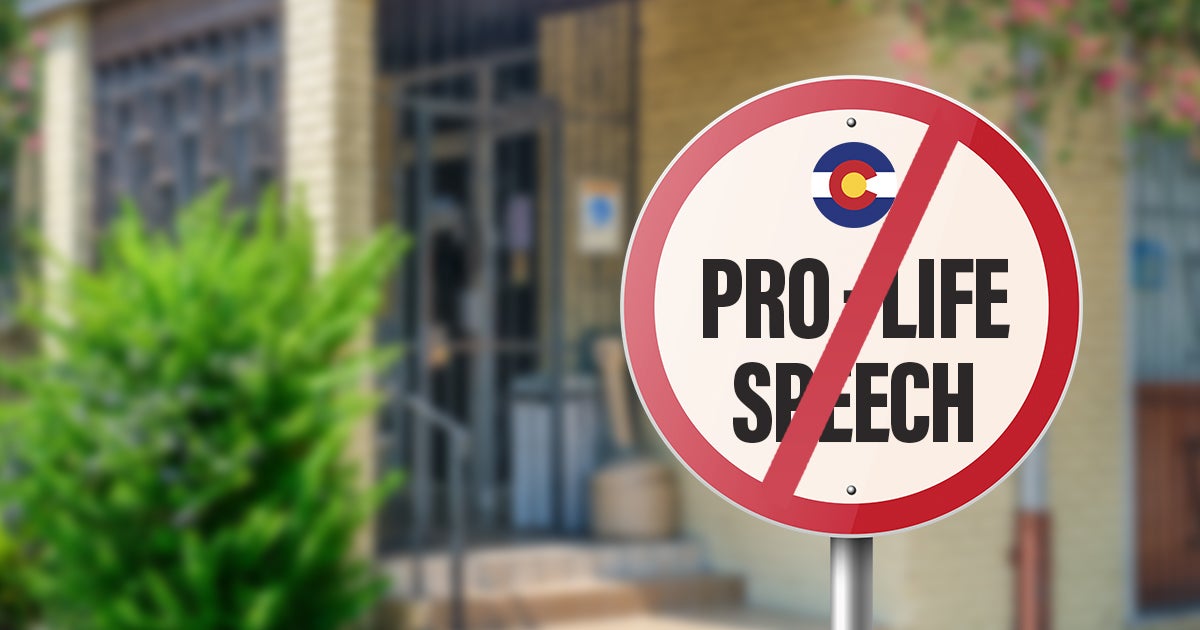
by Jorge Gomez • 4 min read
First Liberty filed a federal lawsuit this week challenging a Colorado state law and a local ordinance that impose severe, content-based restrictions on speech outside abortion centers. Many of those speakers do so out of their religious convictions and conscience. This same state law was the basis of a troubling Supreme Court decision in 2000. Alongside our friends at the law firm Cooper & Kirk, PLLC, we’re making the case that these restrictions violate the First Amendment.
We filed suit on behalf of Wendy Faustin, who has a sincerely held religious belief that human life begins at conception and has God-given worth and dignity. Our client is compelled by these beliefs to advocate publicly on behalf of unborn babies and help women in need. She frequently speaks to women outside abortion facilities, counseling them about alternatives and encouraging them to choose life. Wendy has been active in the pro-life movement for over four decades, and actively supports pregnancy resource centers in the Denver area and pro-life candidates for public office.
Colorado’s law and local ordinances create a “buffer zone” around “health-care” facilities – i.e., abortion facilities. It bans anyone from approaching within eight feet of someone to pass out literature, display a sign, educate or counsel “in the public way or sidewalk area within a radius of one hundred feet from any entrance door.” Any person who does commits a crime. The laws make it a crime to approach someone outside an abortion facility to engage in life-affirming advocacy or counseling. However, speaking to them for any other purpose is fine.
Our attorneys make clear that lawmakers adopted these restrictions with a clear intent: to target people who want to offer pro-life help and alternatives to women and their families in need. They are a prime example of government singling out pro-life speech. Disfavoring speech because of its viewpoint is blatant viewpoint discrimination, which is unconstitutional.
First Liberty Senior Counsel Roger Byron explains:
“The government may not target life-affirming speech simply because it disagrees with the message. That is unlawful viewpoint discrimination. It should not be a crime to lovingly and compassionately approach another person to tell them about alternatives to abortion.”
Charles Cooper, Chairman and Founding Partner at Cooper & Kirk, PLLC, also said, “The First Amendment presumes it is unconstitutional for the government to restrict a private citizen’s expression because of ‘its message, its ideas, its subject matter, or its content.’ The laws imposed by Colorado and Denver favor one message over another. That’s unconstitutional.”
In Hill v. Colorado (2000), the U.S. Supreme Court upheld Colorado’s law as constitutional. Last year, however, the Court issued Dobbs v. Jackson Woman’s Health Organization, the landmark ruling that properly returned the power to regulate abortion back to the states. In Dobbs, the Court specifically stated that cases like Hill “have distorted First Amendment doctrines.”
The First Amendment becomes meaningless when the state disfavors and restricts the speech and viewpoints of Americans, including those whose actions and messages are informed by religious convictions. The freedom of expression that is so deeply cherished in America—a society where diverse views are encouraged—cannot flourish if the government has the power to make the peaceful, free exchange of ideas a crime.
People of faith should not be treated as second-class citizens simply because they express a message the government does not like. First Liberty will continue to defend the right of all Americans from vindictive laws that restrict their speech and First Amendment rights.